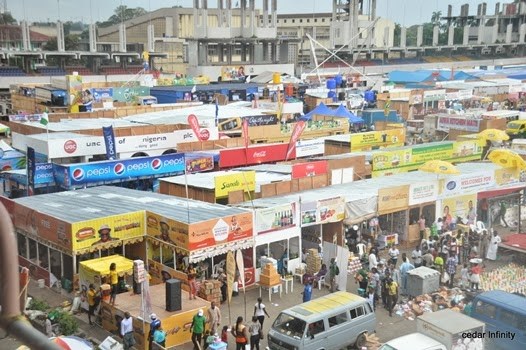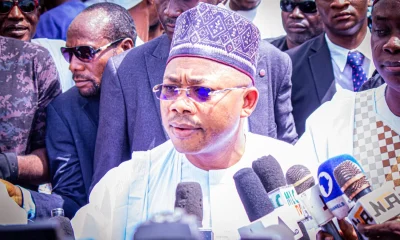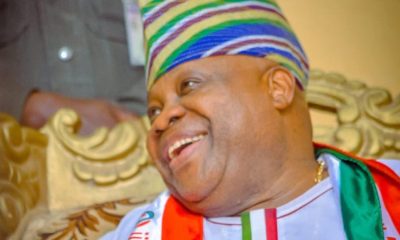Economy
The Promise of a New Revenue Formula

By Salisu Na’inna Dambatta
It is interesting that a new Revenue Sharing Formula by the Revenue Mobilization, Allocation and Fiscal Commission (RMAFC) will be worked out soon to replace the 20-year old existing version.
The Chairman of the Revenue Mobilization Allocation and Fiscal Commission, Mr.
Elias Mbam said that in addition to a new sharing formula, the Commission will “expand the sources of revenue for the Federation. ”“I intend to do this through diversification in areas outside Oil and Gas, and that includes solid minerals, agriculture and manufacturing.”
There is no doubt that the existing renenue allocation formula has been subjected to criticisms by politicians and development experts who believe that the 52.
68 per cent allocated to the Federal Government; the 26.72 per cent to the States and 20.60 per cent for the 744 Local Government Areas in the country is due for retouching.However, it is important to note that in the Nigerian peculiar way of doing things, every Revenue Allocation formula, from the first one introduced in 1948 (on the recommendation of Hicks Philipson Commission of 1946) as part of the Richardson Constitution for the three regions of Nigeria to the extant version, has always been criticised or opposed by people who expressed their various perspectives on how the formulae should have been formulated.
It is to tamper those varied perspectives with reasoning that a framework, based on over a dozen of factors or indices, was developed to accommodate various interests and address divergent concerns and foster national acceptance for it.
The indices in the framework listed by Victor I. Lukpata, Ph.D of the Department of History and Diplomatic Studies, Federal University Wukari, Taraba State, are: Basic needs; Minimum Material Standards; Balanced Development; Derivation;Equality of Access to Development Opportunities;Independent Revenue/Tax effort;Absorptive Capacity and Fiscal Efficiency. Others are Minimum responsibility of Government; Population; Social Development Factor; Equality of States; Landmass and Terrain and finally, Internal Revenue Generation Effort.
The above principles have continued to serve as the yardstick for revenue allocation up to this day.
Each state of the Federation, the 744 Local Government Areas and the Federal Government get a portion from the Federation Account based on these indices. On its part, the Federal Government gets the portion assigned to it because of the huge responsibilies it bears: ensuring national security, caring for the Armed Forces, the Police Force, Foreign Relations, building and maintenance of the most critical roadways, the railways, internal and international maritime services, Customs, Education, Health, Agriculture and National Food Security and the provision of many more money-guzzling public goods nationwide.
In the process of sharing the revenue, the Federal Ministry of Finance chairs the Federation Account Allocation Committee (FAAC) every month. The Secretariat of FAAC is at that Ministry, but the Department of FAAC is domiciled in the Office of the Accountant-General of the Federation (OAGF).
The Commissioners for Finance of the 36 states, a representative of the Federal Capital Territory, Abuja, are members of FAAC, as are revenue-related entities including the RMAFC, the Nigerian National Petroleum Corporation (NNPC), the Nigeria Customs Service (NCS), the Federal Inland Revenue Service (FIRS).
Much is at stake when it comes to revenue sharing. The quantam of money involved makes it so as the following facts reflect. The sum of N8 trillion was shared in 2018 in spite of the shut-ins in several oil installations. The Federation Account Allocation Committee (FAAC) disbursed a total sum of N6.418 trillion in 2017. It was N5. 1 trillion in 2016 and N6. 011 in 2015 respectly.
Every state in the country, except two, get most of the cash they use in paying for the services and development projects they deliver to the public from FAAC disbursements. Their internal revenue generation ability is limited by many factors, including lack of seriousness.
That lack of seriousness led to paucity of funds in the states to the extent that workers could not be paid their monthly entitlements. The federal government lent the states just over N2 trillion, beside paying them billions of Naira in refund regarding Paris Club debt write-off in favour of Nigeria.
Given the life-line status of shared revenues for the three tiers of Government in the country, a promise to craft a new Revenue Sharing Formula for the country by the RMAFC is an exciting matter. So, the nation is eagerly awaiting the new formula, which will ensure that the Federal
Government gets enough resources to provide the kind of services expected from the Centre.
However, it is possible to expand and further diversify the revenue base. The Federal Inland Revenue Service has demonstrated that by bringing more taxables to the tax net.
Indeed, the FIRS has announced that it is now targeting a tax base of 45 million taxables, according to the Executive Secretary, Joint Tax Board (JTB), Mr Oseni Elamah.
Elama said that as at December, 2018, Nigeria’s tax payers data base expanded from 20 million (in 2015) to 35 million. This is a huge increase by any measure.
The taxpayers base can actually surpass the 45 million target if the over 1,000 uncaptured sources of tax identified by researchers commissioned by the Federal Ministry of Finance are brought into the tax net. This was disclosed by former Minister for Finance, Mrs. Kemi Adeosun in a speech in Kano on July 14, 2016 at a Conference on Taxation and Revenue generation.
“Minister of Finance, Mrs. Kemi Adeosun in Kano said the Federal Government had identified more than 1,000 dormant revenue lines, assuring, however, that such huge dormant revenue opportunities will be maximised,” a medium reported.
The RMAFC should in collaboration with other relevant sister agencies take advantage of the work done earlier in its Chairman’s drive to expand the revenue base for the three tiers of Government. It is a desirable and doable task.
The Muhammadu Buhari-led administration will simply add another important achievement in the huge legacy it will leave behind for the benefit of future generations of Nigeria if the revenue sharing or allocation formula is redesigned and dormant revenue-yielding lines are activated.
Economy
Trade Tensions: Global Economy Stands at Fragile Turning Point -UN

The UN Department of Economic and Social Affairs (UN DESA) has said that the global economy stands at a fragile turning point amid escalating trade tensions and growing policy uncertainties.UN DESA, in a report published on Thursday, stated that tariff-driven price pressures were adding to inflation risks, leaving trade-dependent economies particularly vulnerable.
It stated that higher tariffs and shifting trade policies were threatening to disrupt global supply chains, raise production costs, and delay key investment decisions – all of this weakening the prospects for global growth. The economic slowdown is widespread, affecting both developed and developing economies around the world, according to the report.For instance, in the United States, growth is projected to slow “significantly”, as higher tariffs and policy uncertainty are expected to weigh on private investment and consumer spending.Several major developing economies, including Brazil and Mexico, are also experiencing downward revisions in their growth forecasts.China’s economy is expected to grow by 4.6 per cent this year, down from 5.0 per cent in 2024. This slowdown reflects a weakening in consumer confidence, disruptions in export-driven manufacturing, and ongoing challenges in the Chinese property sector.By early 2025, inflation had exceeded pre-pandemic averages in two-thirds of countries worldwide, with more than 20 developing economies experiencing double-digit inflation rates.This comes despite global headline inflation easing between 2023 and 2024.Food inflation remained especially high in Africa, and in South and Western Asia, averaging above six per cent. This continues to hit low-income households hardest.Rising trade barriers and climate-related shocks are further driving up inflation, highlighting the urgent need for coordinated policies to stabilise prices and protect the most vulnerable populations.“The tariff shock risks hitting vulnerable developing countries hard,” Li Junhua, UN Under-Secretary-General for Economic and Social Affairs, said in a statement.As central banks try to balance the need to control inflation with efforts to support weakening economies, many governments – particularly in developing countries – have limited fiscal space. This makes it more difficult for them to respond effectively to the economic slowdown.For many developing countries, this challenging economic outlook threatens efforts to create jobs, reduce poverty, and tackle inequality, the report underlines. (NAN)Economy
FG To Finalize N1.5trn Road Concession Project- Edun

The Minister of Finance and Coordinating Minister of the Economy, Mr Wale Edun, says the Federal Government will soon finalise N1.5 trillion road concession project.
Edun made the statement during a meeting with some private sector investors in Abuja on Wednesday.
He said that the government was on the verge of finalising the landmark N1.
5 trillion road concession project, launched in 2021 under the Highway Development and Management Initiative (HDMI).The minister said that the initiative aimed to involve private sector partners in the reconstruction and management of nine major highways across the country, spanning approximately 900 kilometers.
He said that the partners had almost completed all arrangements for the highways, which they would finance, rebuild, and maintain under 25-years concession agreements.
Edun said that the concessionaires were expected to recoup their investments through tolling fees.
“We met the concessionaires who have virtually concluded all the agreement arrangements for nine roads, nine major highways, which they are contracting to refinance the rebuilding of and to recover their funds from tolling fees under 25-year or so agreements.
“And we met them to iron out the remaining administrative obstacles for the kicking off construction of these roads,” he said.
Edun said that the substantial private sector investment would bridge budgetary gaps.
He added that it would also allow investors to undertake revenue-generating projects, leveraging their expertise and resources for long-term implementation and maintenance.
“Thereafter, it will be a question of signing the addendums and moving to the site.
“As you know, already the 125-kilometer Benin–Asaba Highway concession agreement has been signed. The addendum has been signed.
“All arrangements have been finalised, in fact, the ministry of works have handed over the road to the concessionaires.
“They have already started the preliminary arrangements for reconstruction of that road in place of a 10 lane highway.
“It is an investment, it’s a project and an initiative that will reduce the travel time between Benin and Asaba right up to the Niger Bridge,” the minister said.
Edun said that the Benin–Asaba Highway project, which has already commenced, is expected to reduce travel time between Benin and Asaba from four hours to one hour, significantly enhancing productivity and efficiency in the region.
He described the HDMI, launched in 2021, as a strategic programme by the federal government aimed at attracting private sector investment to improve Nigeria’s federal road network.
Edun said that the initiative seeks to address the challenges of inadequate funding and maintenance by leveraging Public-Private Partnerships (PPP) to develop and manage road infrastructure.
Under the HDMI, 12 highways were initially selected for concession, covering a total of 1,963 kilometers.
These roads include Benin–Asaba, Abuja–Lokoja, Kano–Katsina, Onitsha–Owerri–Aba, Shagamu–Benin, Abuja–Keffi–Akwanga, Kano–Shuari.
Others are Potiskum–Damaturu, Lokoja–Benin, Enugu–Port Harcourt, Ilorin–Jebba, Lagos–Ota–Abeokuta, and Lagos–Badagry–Seme roads.
The minister said that the initiative was projected to generate over 50,000 direct and 200,000 indirect jobs, contributing significantly to the country’s economic growth and development.
The Minister of Works, Engineer David Umahi who joined the meeting virtually reassured the private sector partners on the HDMI of the federal government commitment.
He said that everything possible would be done to resolve the contending issues, adding he will soon be back to address all pending issues.
One of the concessionaires, Mr Kola Karim, representing Shoreline, emphasised the need for right and enforceable documents stipulating the takeoff and handover dates, which would attract investors to invest their funds.
Other private sector partners also requested for the addendum to the original agreement to be signed that would enable toll sections of the completed highways while work was in progress on other sections.
They noted that each concessionaire has unique challenges that should be dealt with accordingly.
Also in the meeting were Minister of Budget and Economic Planning, Abubakar Bagudu, and the Director General Infrastructure Concession and Regulatory Commission (ICRC), Dr Jobson Ewalefoh
Business Analysis
Nigeria Customs Generates over N1.75trn Revenue in 2025
By Joel Oladele, Abuja
The Nigeria Customs Service (NSC) has generated an impressive N1,751,502,252,298.05 in revenue during the first quarter of 2025.
The Comptroller-General (CG) of the Service, Bashir Adeniyi, disclosed this yesterday, during a press briefing in Abuja.
According to Adeniyi, the achievement not only surpasses the quarterly target but also marks a substantial increase compared to the same period last year, reflecting the effectiveness of recent reforms and the dedication of customs officers across the nation.
“This first quarter of 2025 has seen our officers working tirelessly at borders and ports across the nation.
I’m proud to report we’ve made real progress on multiple fronts—from increasing revenue collections to intercepting dangerous shipments,” Adeniyi stated.He attributed this success to the reforms initiated under President Bola Tinubu’s administration and the guidance of the Honourable Minister of Finance and Coordinating Minister of the Economy, Olawale Edun.
The CG noted that the revenue collection for Q1 2025 exceeded the quarterly benchmark of N1,645,000,000,000.00 by N106.5 billion, achieving 106.47% of the target. This performance represents a remarkable 29.96% increase compared to the N1,347,705,251,658.31 collected in Q1 2024.
Adeniyi highlighted the month-by-month growth, noting that January’s collection of N647,880,245,243.67 surpassed its target by 18.12%, while February and March also showed positive trends.
“I’m pleased to report the Service’s revenue collection for Q1 2025 totaled N1,751,502,252,298.05.
“Against our annual target of N6,580,000,000,000.00, the first quarter’s proportional benchmark stood at N1,645,000,000,000.00. I’m proud to announce we’ve exceeded this target by N106.5 billion, achieving 106.47% of our quarterly projection. This outstanding performance represents a substantial 29.96% increase compared to the same period in 2024, where we collected N1,347,705,251,658.31.
“Our month-by-month analysis reveals even more encouraging details of this growth trajectory,” Adeniyi said.
In addition to revenue collection, Adeniyi said the NCS maintained robust anti-smuggling operations, recording 298 seizures with a total Duty Paid Value (DPV) of ₦7,698,557,347.67.
He stated that rice was the most seized commodity, with 135,474 bags intercepted, followed by petroleum products and narcotics.
“From rice to wildlife, these seizures show our targeted approach,” Adeniyi remarked, noting the NCS’s commitment to combating smuggling and protecting national revenue.
Adeniyi also highlighted key initiatives, including the expansion of the B’Odogwu customs clearance platform and the launch of the Authorized Economic Operators Programme, which aims to streamline processes for compliant businesses. The NCS’s Corporate Social Responsibility Programme, “Customs Cares,” was also launched, focusing on education, health, and environmental sustainability.
Despite these achievements, the CG noted that the NCS faced challenges, including exchange rate volatility and non-compliance issues. Adeniyi acknowledged the need for ongoing adaptation and collaboration with stakeholders to address these challenges effectively.
Looking ahead, the NCS aims to continue its modernization efforts and enhance service delivery, ensuring that it remains a critical institution in Nigeria’s economic and security landscape.
“Results speak louder than plans; faster clearances through B’Odogwu, trusted traders in the AEO program, and measurable food price relief from our exemptions. We’ll keep scaling what works,” he concluded.




























